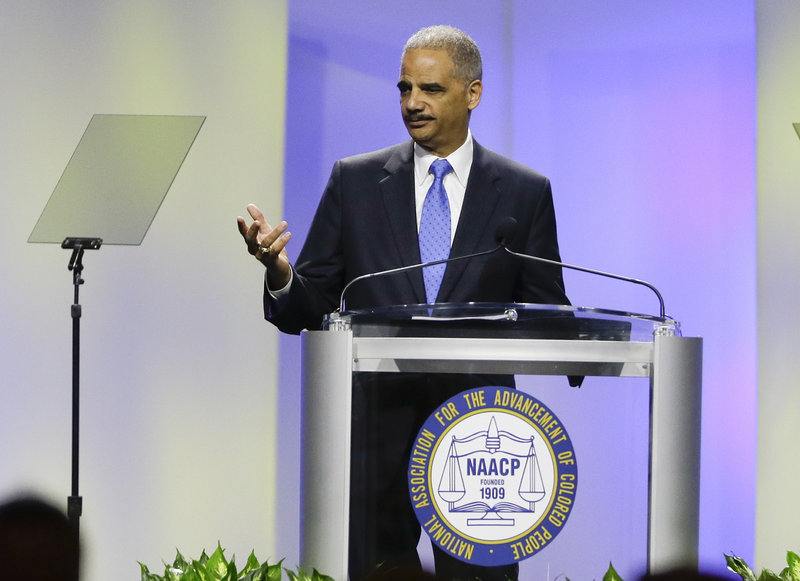WASHINGTON — With the U.S. facing massive overcrowding in its prisons, Attorney General Eric Holder called Monday for major changes to the nation’s criminal justice system that would scale back the use of harsh sentences for certain drug-related crimes.
In remarks to the American Bar Association in San Francisco, Holder said he also favors diverting people convicted of low-level offenses to drug treatment and community service programs and expanding a prison program to allow for release of some elderly, nonviolent offenders.
“We need to ensure that incarceration is used to punish, deter and rehabilitate — not merely to convict, warehouse and forget,” Holder said.
In one important change, the attorney general said he’s altering Justice Department policy so that low-level, nonviolent drug offenders with no ties to gangs or cartels won’t be charged with offenses that impose mandatory minimum sentences.
Under the changed policy, the attorney general said defendants will be charged with offenses for which accompanying sentences “are better suited to their individual conduct, rather than excessive prison terms more appropriate for violent criminals or drug kingpins.”
The impact of Holder’s initiative on mandatory minimum sentences could be significant, says Marc Mauer, executive director of the Sentencing Project, a nonprofit group involved in criminal justice reform.
There are roughly 25,000 drug convictions in federal court each year and 45 percent of those are for lower-level offenses such as street-level dealers and couriers and people who deliver drugs, said Mauer.
The unanswered question is how each of the 94 U.S. Attorney’s offices will implement changes, given the authority of prosecutors to exercise discretion in criminal cases.
U.S. Attorney for Maine Thomas E. Delahanty II said the policy change is relevant here because a notable percentage of drug cases are prosecuted at the federal level.
“Each U.S. attorney has been given substantial discretion to make adjustments to policies and procedures that would impact the local district,” Delahanty said. “One of the benefits of it is it provides substantially more guidelines than we have had in the past.”
Delahanty said his office is now reviewing specifics on how the policy shift will alter practices locally.
“Because this is new, we don’t have a precise timetable,” he said.
David Beneman, federal public defender for the District of Maine, said Holder’s announcement will give clarity on the question of who should be charged with drug offenses with minimum mandatory sentences determined by drug weight.
Beneman said that before the policy shift, defendants on the periphery of a drug distribution ring could face the same lengthy sentences as a drug ring’s key dealers. Now, judges and prosecutors will have more discretion.
“This is a very positive thing,” Beneman said. “It is not political in terms of left or right. Progressives or conservatives don’t support overregulating or excessive control to government. This doesn’t undermine law enforcement in any way.”
Holder said mandatory minimums “are ultimately counterproductive.”
Holder said new approaches — which he calls the “Smart On Crime” initiative — are the result of a Justice Department review.
The attorney general said some issues are best handled at the state or local level and that he has directed federal prosecutors across the country to develop locally tailored guidelines for determining whether federal charges should be filed.
“By targeting the most serious offenses, prosecuting the most dangerous criminals, directing assistance to crime ‘hot spots,’ and pursuing new ways to promote public safety, deterrence, efficiency and fairness — we can become both smarter and tougher on crime,” Holder said.
The attorney general said 17 states have directed money away from prison construction and toward programs and services such as treatment and supervision that are designed to reduce the problem of repeat offenders.
Holder also said the department is expanding a policy for considering compassionate release for inmates facing extraordinary or compelling circumstances, and who pose no threat to the public. He said the expansion will include elderly inmates who did not commit violent crimes and who have served significant portions of their sentences.
Press Herald Staff Writer Scott Dolan contributed to this report.
Copy the Story Link
Send questions/comments to the editors.



Success. Please wait for the page to reload. If the page does not reload within 5 seconds, please refresh the page.
Enter your email and password to access comments.
Hi, to comment on stories you must . This profile is in addition to your subscription and website login.
Already have a commenting profile? .
Invalid username/password.
Please check your email to confirm and complete your registration.
Only subscribers are eligible to post comments. Please subscribe or login first for digital access. Here’s why.
Use the form below to reset your password. When you've submitted your account email, we will send an email with a reset code.